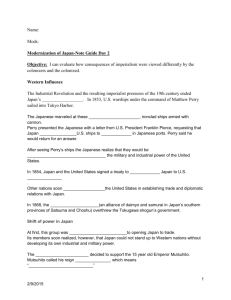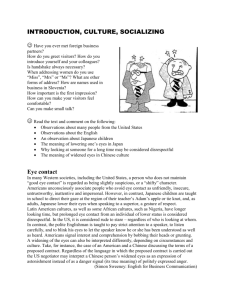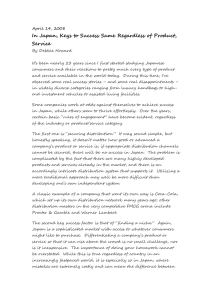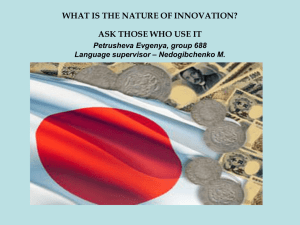File
advertisement
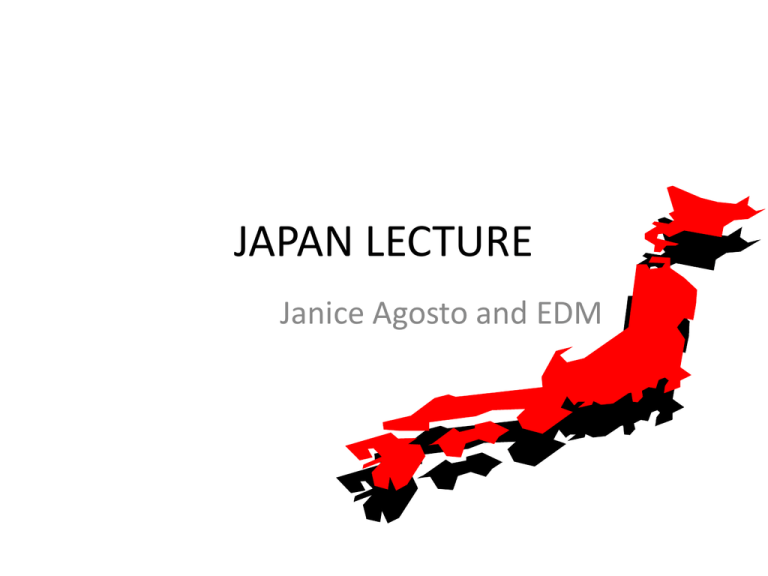
JAPAN LECTURE Janice Agosto and EDM Instructions • Fill in the gaps to this Lecture PowerPoint. • Write 6 summary paragraphs based upon the lecture and the PowerPoint regarding the 6 lenses of PERSIA. Be sure to have a topic sentence in each paragraph • Create viable Thesis statements in regard to Japanese history. ERSIA Political • Korean migrants impacted agriculture by importing rice, bronze, and metals • Japan’s staple food then became rice, wheat, and yams Possible Thesis Statements • “If you can control the agriculture, you can practically control the society” • “Without food there would be no politics” P: Clan Systems Don’t mix clans Tribal Born into particular clan >>By the 6th century, islands were ruled by different clans. >>Shah- King of Kings P: continued • Ruled through Kami [God] worship • Yamato clan >>Stole a lot of beliefs from Chinese [T’ang Dynasty and Sui Dynasty] >>There came a movement to centralize power >>Claimed to be the best >>Aristocratic clans claim to own everything even if that may not be the case >>Chinese styled bureaucracy >>Support of Confucianism and Buddhism >>Capital located to Nara, a complete replica of Chinese capital [Chang ‘an] >>Chinese “hegemony”- people try to replicate gov’t, system, movement, etc. P: continued • Fujiwara >>700s-1185 >>Longevity [staying to power] • Confucianism takes over era -classics -poetry -decorating [interior] -paintings -pursuit of refinement • Takes place from warrior class to imperial class • Experienced warrior class would eventually take over and start BAKUFU [tent government] • Japan becomes military government [1100-1500] P: continued • Minamoto >>starts shogunate >>new capital Kamakura [present day Tokyo] >>other ‘capital’ –Kyoto >>Bakufu- have a good study of European Feudalism >>Military is gaining support from social class >>The concept “Position not wealth” was thrown out by Tent Government >>Local Lord- Daimyo >>Centralized Government falling; local lords have their own military P: continued • Toyotomi Hideyoshi >>Unifying general >>Remembers the rule: To gather support and rule a country- you must have a common enemy >>Japanese hegemony over China and Korea >>1600: China and Korea starts looking to Japan for ‘wisdom’ >>1603: Tokugawa Shogunate >>Moves capital to Edo [ancient name for Tokyo] >>1603-1867: Japan is culturally unified through a military system >>Alternative Attendance Policy “keep you enemies closer” • Daimyo >>Religioncapital >>Weakened political power P: continued • The Dutch >>Traders get kicked out with exception of the Dutch • Miracle of Perry [Commander Matthew Perry] >>1850s forces Treaty of Kawagawa >>Demands trade w/ America >>Leads to dominance of Japan in war >>Unequal Treaty benefited Japan Summary Paragraph P ERSIA conomic • Japan and T’ang Dynasty >>Feudalism was heavily dependant on poor labor force [peasants] >>Knights owned land >>Samurais did not >>Land Use Rights: You can use it, but it’s not passed down >>Limited ability to pass down land >>Land was not as important to Japan as in Europe >>Strong loyalty to Daimyo who owns the land >>Daimyos lost power due to Alternate Attendance Policy >>Gained more time to focus on “farmville” >>Surge of population takes place E: continued • European -increases trade -Portuguese comes and trades w/ Japanese within ports -lords living within coasts becomes richer due to more trade with Portuguese -This upsets balance -Portuguese creates stronger Japanese gov’t by their trading -Religion also bought by Portuguese -Japanese didn’t pay much attention to it -The Japanese were only interested in trading DOING IT FOR PROFIT NOT FOR THE PROPHET~~ haha get it? E: continued • Growth in cities • Urbanization • Consensus policy decides how everything is done, everyone has to agree on something • Taxing farmers lingered • Commander Mather Perry >>Miracle of Perry >>Made Japanese open ports >>Unequal Treaty- one side forces other to sign a treaty >>UK started war over the use of Opium >>China obtained port Hong Kong, UK had to return it due to the treaty E: continued • Meiji Era >>Japan becomes an Imperialistic gov’t >>1860s- end of WWII • Expansionism >>Pearl Harbor attack December 7th 1941 >>As a result US declared war on Japan and attacked Germany >>America told Japan to dump military, and instead got better at technology Summary Paragraph PERELIGION SIA • Religion becomes tool for politics • Religion- group/congregation • Belief- individual R: continued • Shintoism - native religion of Japan - worship of ancestors and natural forces -polytheistic • Once Buddhism came in, Shintoism decreased • Reemerges as top religion on 1868 in Japan • Shintoism then becomes official state religion, making the Emperor a ‘God’ • Emperor Worship lasted from 1868- end of WWII R: continued • Used as a political tool • 1945- McArthur promoted US style democracy • Religion is officially separated from gov’t in 1947 constitution Summary Paragraph ocial PERS IA • • • • • • • • • • • First Japanese novel written by Japanese woman Living by the Bushido Code [chivalry] Hari kari- ritualized suicide for honor Feudalism diminished Chinese influence Confucian influence Merchants became economically higher but socially lower Rice trade influenced merchants’ wealth Rice- wealthiest Silk- 2nd Sake- 3rd Pawn Brokers- 4th “HISTORY IS ONE BIG NASTY ACCIDENT” - Mr. DeMott S: continued • • • • • • • • • • • Shift from military society to civil society Samurais falling Status defined by clothing Money is not highly valued, class is Perry creates civil war Perry un-isolates Japan Japanese learns western ways all too well Imperialism dies down in western world after the war In Japan it happened otherwise Japanese learns western weaponry Decides to take on Russia 1900-1905 S: continued • • • • • • • WWII social changes due to McArthur Heian Era- strong Chinese influence WWII officially ends 1970 Turbo boats created Politics capital- Tokyo Imperial House capital- Kyoto Started building roads and societies along the roads • 1600s- increase use of abortion Summary Paragraph PERSI A ntellectual • Perry creates catalyst >education >military organizations >industrialization >nationalism and superiority • Japanese leap-frogged United States [they took our ideas, skipped mistakes, and made it better] Summary Paragraph PERSIArts • Architecture based upon China’s • Temples built by Japanese surpassed China’s original • China has just been LEAP-FROGGED • Munsuki Shikibu >>first novel >>Tale of Genji • Neo-confucianism • Modification of social classes • Poetry, novel, satire, kabuki theatre Summary Paragraph Thesis Statements related to Japan

